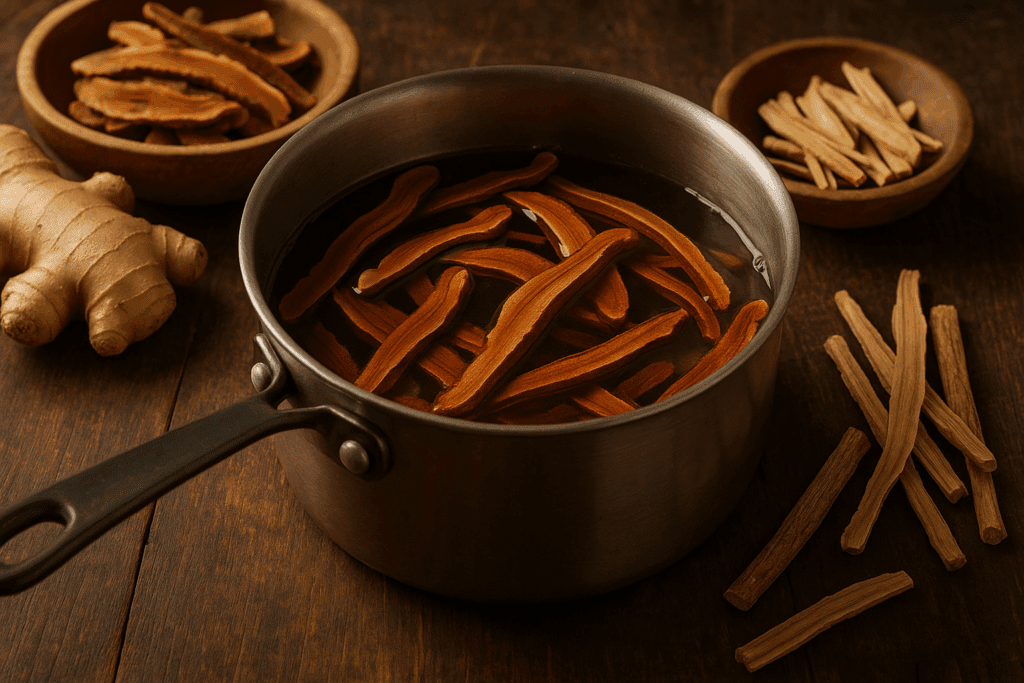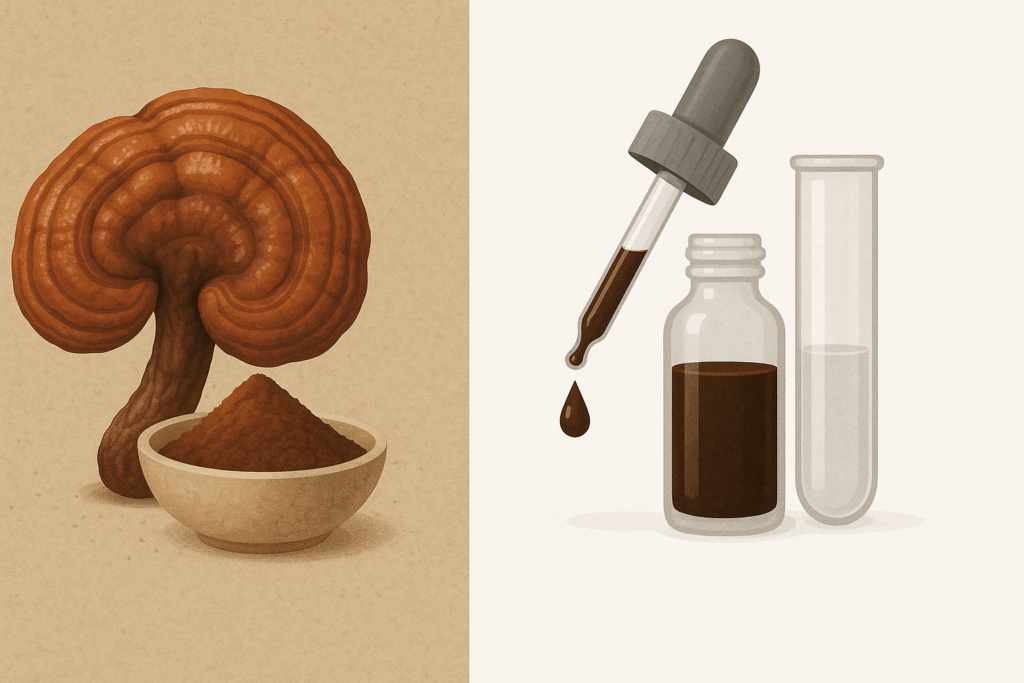Introduction: Embracing the Power of Reishi for Modern Stress Relief
In a world increasingly dominated by stress, environmental toxins, and the relentless demands of modern living, the search for natural solutions has never been more critical. One ancient remedy rising anew into the spotlight is reishi mushroom, a botanical celebrated for centuries in Eastern medicine for its calming and adaptogenic properties. For those seeking holistic strategies to manage anxiety and fortify their resilience, understanding how to eat reishi mushroom and how to use reishi powder can offer transformative insights. As adaptogenic mushrooms continue to gain credibility in scientific research, reishi stands out for its ability to help the body adapt to stressors while supporting overall vitality. This guide explores the best ways to incorporate reishi into daily life, grounded in science and tradition, to empower your journey toward mental balance and enhanced well-being.
You may also like: The Essential Guide to Reishi Mushroom Benefits: How to Use Reishi Mushroom Powder for Stress Relief and Adaptogenic Support

The Ancient Origins and Modern Science Behind Reishi’s Adaptogenic Power
The history of reishi, known scientifically as Ganoderma lucidum, stretches back over 2,000 years, where it was revered in traditional Chinese medicine as the “Mushroom of Immortality.” Ancient healers prized it not only for its spiritual symbolism but also for its capacity to promote longevity, vitality, and inner calm. Today, modern science has begun to validate these traditional uses, uncovering a wealth of bioactive compounds in reishi that influence human health. Triterpenoids, polysaccharides, and peptidoglycans present in reishi are now recognized for their role in modulating immune responses, reducing inflammation, and balancing cortisol levels, the hormone most closely tied to stress. By marrying ancient wisdom with contemporary research, reishi has emerged as a cornerstone in the growing field of adaptogenic supplements aimed at supporting mental health.

How to Eat Reishi Mushroom for Maximum Stress-Relief Benefits
Learning how to eat reishi mushroom effectively can significantly impact how well you harness its calming properties. Unlike culinary mushrooms such as shiitake or portobello, reishi’s tough, woody texture and bitter taste make it unsuitable for traditional cooking methods. Instead, reishi is typically consumed as a decoction, where sliced or powdered mushroom is simmered gently in water to extract its beneficial compounds. Making reishi tea is one of the most common ways to consume it, with a slow simmering process that allows triterpenes and polysaccharides to infuse into the water. Adding complementary herbs like ginger or licorice root can enhance the flavor while offering synergistic health benefits. For those seeking convenience, pre-sliced dried reishi or powdered forms can be used to simplify the preparation process, making it easier to integrate into busy lifestyles.
Why Knowing How to Eat Reishi Mushroom Enhances Adaptogenic Support
Understanding the nuances of how to eat reishi mushroom not only improves bioavailability but also maximizes its adaptogenic potential. For instance, consuming reishi with a small amount of healthy fat such as coconut oil or avocado can aid in the absorption of fat-soluble triterpenes. Furthermore, pairing reishi with vitamin C-rich foods like citrus fruits can enhance the absorption of its polysaccharides, thereby amplifying its immune-supportive effects. Timing also matters; many herbalists recommend consuming reishi in the evening due to its natural calming influence, which can promote deeper, more restorative sleep. By approaching reishi consumption with intention and knowledge, individuals can unlock its full spectrum of benefits, transforming it from a simple supplement into a cornerstone of their stress management toolkit.
Practical Methods on How to Eat Reishi Mushroom Daily
Incorporating reishi into your daily routine need not be complex or burdensome. One practical method is preparing a large batch of reishi tea at the beginning of the week and storing it in the refrigerator, allowing for easy reheating or consumption as an iced beverage. Adding reishi tea to smoothies, soups, or even oatmeal can subtly infuse your diet with its adaptogenic properties without overpowering the flavor profile. Some individuals enjoy combining reishi powder into homemade energy balls or protein bars, blending it with dates, nuts, and seeds for a convenient, on-the-go stress-relief snack. Culinary creativity opens many doors for integrating reishi naturally into meals, ensuring consistent and enjoyable usage.

How to Use Reishi Powder for Holistic Stress Management
For those seeking a more versatile and concentrated option, understanding how to use reishi powder becomes essential. Reishi powder, often produced by finely grinding dried reishi mushrooms, offers a highly adaptable form for supplementation. It can be stirred into hot beverages like coffee or matcha, incorporated into baking recipes, or blended with nut butters for a simple, healthful treat. Because reishi powder is more concentrated than decocted tea, dosing becomes an important consideration. Most experts recommend starting with small amounts, typically half a teaspoon per day, and adjusting based on individual response. Listening to your body and consulting with a healthcare provider ensures that you reap maximum benefits while minimizing any potential side effects.
How to Eat Reishi Mushroom in Tincture and Capsule Form
For individuals with particularly busy lifestyles, consuming reishi through tinctures or capsules offers a highly convenient alternative. Tinctures, which are liquid extracts made by steeping reishi in alcohol or glycerin, allow for rapid absorption and easy dose control. A few drops under the tongue or mixed into water or tea can provide quick access to reishi’s adaptogenic properties. Capsules, meanwhile, offer precise dosing without any bitterness or preparation time, making them an attractive option for those new to herbal supplements. However, it is essential to select high-quality products from reputable brands that verify purity and potency through third-party testing, as not all supplements are created equal. By choosing wisely, even the busiest individuals can enjoy the profound stress-relieving benefits of reishi.
Exploring the Therapeutic Compounds in Reishi: Why It Works
Delving deeper into why reishi is so effective for stress relief reveals a complex tapestry of bioactive compounds working in synergy. Polysaccharides, particularly beta-glucans, enhance immune function and support the body’s resilience against external stressors. Triterpenoids possess anti-inflammatory and antihistamine properties, helping to calm both physical and emotional responses to stress. Additionally, ganoderic acids, unique to reishi, contribute to liver protection and detoxification, further enhancing the body’s ability to cope with modern environmental pressures. By working on multiple physiological systems simultaneously, reishi embodies the essence of adaptogenic support: balancing, fortifying, and protecting without overstimulating or sedating.
How to Use Reishi Powder to Complement Other Adaptogenic Herbs
One of the strengths of reishi lies in its synergy with other adaptogens. Learning how to use reishi powder alongside herbs like ashwagandha, rhodiola, or holy basil can create a comprehensive adaptogenic formula tailored to your unique stress profile. For example, blending reishi with ashwagandha may enhance resilience to mental and emotional stress, while combining it with rhodiola may boost physical stamina and cognitive clarity. Such combinations can be brewed into teas, crafted into tinctures, or blended into powdered mixes for use in smoothies and functional foods. Personalizing your adaptogen regimen with the inclusion of reishi opens new dimensions of support for navigating the challenges of modern life.
Potential Side Effects and Safety Considerations
While reishi is generally considered safe for most individuals, understanding potential side effects and contraindications is crucial. Some people may experience mild digestive upset, dry mouth, or dizziness when first starting reishi supplementation, particularly at higher doses. Those with bleeding disorders or individuals on anticoagulant medications should exercise caution, as reishi may possess mild blood-thinning properties. Pregnant or breastfeeding women should consult their healthcare providers before using reishi, as comprehensive safety studies in these populations are limited. By starting with low doses and monitoring individual reactions, most people can safely enjoy the many benefits of this remarkable mushroom.

How to Eat Reishi Mushroom for Sleep Support and Anxiety Reduction
An often-overlooked aspect of how to eat reishi mushroom is its potential for enhancing sleep quality and mitigating anxiety symptoms. Traditional Chinese medicine classifies reishi as a “shen” tonic, meaning it nourishes the spirit and calms the mind. Modern research supports these claims, suggesting that reishi may influence the parasympathetic nervous system to promote relaxation and improve sleep onset. Consuming reishi tea approximately one hour before bedtime can create a calming nighttime ritual that signals the body to prepare for rest. Blending reishi with other sleep-supportive herbs such as chamomile, lemon balm, or passionflower can further amplify its effects, offering a gentle and natural pathway to deeper, more restorative sleep.
How to Use Reishi Powder in Functional Beverages
Functional beverages—drinks formulated with health-boosting ingredients—provide a popular and effective way to incorporate reishi powder into daily life. Adding a scoop of reishi powder to coffee, hot cocoa, golden milk, or green smoothies not only boosts nutritional content but also seamlessly integrates adaptogenic support into familiar routines. Functional coffee blends featuring reishi, lion’s mane, and chaga have become increasingly popular among health-conscious consumers seeking alternatives to traditional energy drinks or sugary beverages. Crafting your own functional beverage at home empowers you to control ingredients, dosing, and flavor profiles, ensuring that every sip supports your stress management goals.
Advanced Recipes Using Reishi for Stress Relief
Expanding your reishi repertoire through advanced recipes can elevate your wellness practices to new heights. Consider crafting a calming reishi cacao elixir by blending reishi powder with raw cacao, cinnamon, a splash of almond milk, and a touch of honey. This rich, nourishing beverage offers antioxidant and adaptogenic support in a delicious form. Alternatively, create a reishi-infused bone broth by simmering grass-fed beef bones with reishi slices, ginger, garlic, and turmeric. This savory preparation delivers profound nourishment for both body and spirit. Experimenting with these recipes ensures that your adaptogenic practice remains enjoyable and sustainable over the long term.

Comparing Reishi Powder vs. Reishi Extracts for Stress Relief
When choosing between reishi powder and reishi extracts, understanding their differences is essential for maximizing benefits. Reishi powder consists of the whole mushroom ground into a fine powder, retaining its full spectrum of nutrients. Extracts, however, concentrate specific compounds such as beta-glucans or triterpenes, offering a more potent therapeutic effect per dose. Extracts are often standardized, meaning they provide consistent levels of active ingredients, making them ideal for targeted interventions like stress management or immune support. Both forms have their merits, and selecting the appropriate one depends on individual goals, lifestyle, and sensitivity levels.
Scientific Studies on Reishi for Anxiety and Stress
A growing body of scientific research supports reishi’s reputation as a natural ally against stress and anxiety. Animal studies have demonstrated that reishi supplementation can modulate neurotransmitters such as serotonin and dopamine, fostering improved mood and reduced anxiety-like behaviors. Human studies, while still emerging, suggest that reishi may help alleviate symptoms of fatigue, irritability, and restlessness—common markers of chronic stress. As scientific understanding deepens, reishi’s role in integrative mental health approaches continues to gain traction, offering hope and validation to those seeking natural support.
How to Choose High-Quality Reishi Supplements
Not all reishi products are created equal, and selecting a high-quality supplement is crucial for safety and efficacy. Look for products that clearly indicate whether they use the fruiting body or mycelium; the fruiting body typically contains higher concentrations of therapeutic compounds. Seek brands that provide third-party testing for heavy metals, pesticides, and active ingredient potency. Organic certification and sustainable harvesting practices are additional markers of a reputable product. Investing in quality ensures that your reishi supplementation is both effective and ethically responsible.
Long-Term Adaptogenic Strategies with Reishi
Incorporating reishi into a long-term adaptogenic strategy requires patience, consistency, and mindfulness. Adaptogens work gradually, supporting the body’s natural rhythms and resilience over time rather than delivering immediate results. Maintaining daily or near-daily reishi consumption, varying the preparation methods to keep the routine enjoyable, and combining reishi with other supportive lifestyle practices such as meditation, exercise, and nourishing diet all contribute to lasting benefits. By committing to this holistic approach, individuals can cultivate profound, sustainable resilience to life’s inevitable stresses.
Frequently Asked Questions About How to Eat Reishi Mushroom and How to Use Reishi Powder for Stress Relief
What Is the Best Time of Day for How to Eat Reishi Mushroom to Maximize Stress Relief?
The optimal time for how to eat reishi mushroom is generally in the evening, particularly if your primary goal is to promote relaxation and improve sleep quality. However, timing can vary based on your individual response and lifestyle. Some people report enhanced daytime focus when consuming reishi in the morning as part of a mindfulness routine. Experimenting with different times can help you fine-tune when your body responds best to its calming effects. Tracking your mood, sleep, and energy levels after different consumption times offers a personalized, data-driven approach to maximizing benefits.
Can You Combine Different Preparation Methods for How to Eat Reishi Mushroom?
Yes, combining different methods for how to eat reishi mushroom can yield a more comprehensive adaptogenic effect. For example, you might brew a reishi decoction for evening use while adding reishi powder to your morning smoothie. This layered approach can support both immediate and long-term stress management. Using both tea and powder allows you to tap into a broader spectrum of bioactive compounds, as certain preparation methods extract different nutrients more efficiently. Diversifying your intake also helps keep your adaptogen regimen sustainable and engaging over time.
How to Use Reishi Powder Creatively in Everyday Cooking?
Learning how to use reishi powder in culinary dishes can make your wellness routine far more enjoyable. Beyond beverages, reishi powder can be subtly blended into savory dishes like stews, curries, and marinades. When mixed into sauces or dressings, its earthy bitterness can complement ingredients like garlic, tamari, and sesame oil, enriching the umami profile. Some culinary experts even infuse reishi powder into homemade nut butters, offering a daily dose of adaptogens on toast or with fruits. By reimagining reishi as a culinary ally, you can integrate stress relief seamlessly into your meals without relying solely on supplements.
Is There a Difference Between How to Eat Reishi Mushroom Fresh vs. Dried?
Understanding how to eat reishi mushroom fresh compared to dried versions reveals important nuances. Fresh reishi tends to be less potent because its water content dilutes the concentration of triterpenes and polysaccharides. Dried reishi, by contrast, is more concentrated and better suited for making decoctions or powders. Fresh reishi is rarely consumed raw due to its intense bitterness and fibrous texture, often requiring prolonged boiling. If you have access to fresh reishi, it can be fascinating to explore traditional simmering techniques, but for practicality and potency, dried forms remain the preferred choice.
How Long Should You Take Reishi Consistently to Notice Results?
When it comes to how to use reishi powder and whole forms effectively, consistency is key. Most individuals begin to notice subtle improvements in stress resilience, sleep quality, and mood within three to six weeks of regular consumption. Unlike quick-acting pharmaceuticals, adaptogens like reishi work gradually to rebalance internal systems. Maintaining daily intake without major gaps is essential for allowing cumulative effects to manifest. Documenting your journey in a wellness journal can help you track progress and make informed adjustments along the way.
How to Eat Reishi Mushroom with Other Superfoods for Amplified Benefits?
Pairing how to eat reishi mushroom strategies with other superfoods can create a synergistic wellness effect. For example, blending reishi tea with turmeric root can enhance anti-inflammatory pathways, while pairing it with cacao can boost mood and cognitive resilience. Integrating vitamin C-rich superfoods like camu camu or acerola cherry alongside reishi can enhance polysaccharide absorption. These combinations allow you to craft highly customized functional beverages that support not just stress relief but overall vitality. Approaching reishi as part of a broader nutrient matrix unlocks its fullest potential.
How to Use Reishi Powder for Emotional Resilience During High-Stress Periods?
Strategically learning how to use reishi powder during acute periods of stress can offer emotional buffering. Doubling your usual reishi dose for a few days—while staying within safe limits—may enhance its calming effects during intense work deadlines or personal challenges. Incorporating reishi into a calming evening ritual, like a tea ceremony with soft music or journaling, further deepens its emotional benefits. Studies suggest that reishi’s influence on neurotransmitter systems may help stabilize mood and support adaptive coping mechanisms. This strategic use transforms reishi from a passive supplement into an active ally during life’s storms.
Can How to Eat Reishi Mushroom Affect Cognitive Performance?
Interestingly, mastering how to eat reishi mushroom regularly may offer subtle cognitive enhancements. Research points to reishi’s antioxidant and anti-inflammatory properties as protective factors for brain health, potentially improving clarity, memory, and focus over time. Although reishi is primarily revered for stress modulation, its indirect effects on reducing oxidative stress may support mental performance. Athletes, entrepreneurs, and students alike may benefit from integrating reishi into their cognitive wellness routines. However, it’s crucial to manage expectations, as reishi is not a stimulant but rather a long-term resilience builder.
How to Use Reishi Powder Safely Alongside Medications or Supplements?
Understanding how to use reishi powder safely alongside medications requires careful planning. Since reishi may exert mild blood-thinning effects, individuals on anticoagulants, antiplatelet drugs, or immunosuppressants should consult healthcare providers before starting supplementation. Similarly, combining reishi with other adaptogens like ginseng or ashwagandha should be approached thoughtfully to avoid overstimulation or unintended interactions. A gradual introduction, starting with half doses and monitoring for any changes in blood pressure, digestion, or mood, ensures safer integration. Personalized medical advice remains the gold standard when incorporating reishi into a broader therapeutic regimen.
What Are Emerging Trends in How to Eat Reishi Mushroom for Future Wellness Applications?
Emerging trends in how to eat reishi mushroom reflect its expanding role in biohacking, personalized nutrition, and functional medicine. Novel delivery systems such as nanoemulsions, liposomal extracts, and fermented reishi preparations are gaining traction for enhancing bioavailability. Researchers are also exploring reishi’s potential role in gut-brain axis modulation, highlighting its prebiotic effects as a secondary mechanism for stress relief. Customized reishi blends targeting specific needs, such as cognitive performance, athletic recovery, or hormone balance, are likely to shape future supplement markets. Staying informed about these innovations ensures that consumers can leverage reishi’s benefits at the cutting edge of natural health science.
Conclusion: Unlocking the Full Potential of Reishi for Lifelong Adaptogenic Support
Harnessing the extraordinary benefits of reishi mushroom offers a time-honored yet scientifically validated pathway to managing modern stress and cultivating holistic health. By mastering how to eat reishi mushroom and how to use reishi powder effectively, individuals can unlock a wealth of adaptogenic support that harmonizes mind, body, and spirit. From brewing rich, calming teas to crafting functional superfood recipes, reishi provides a versatile and potent ally in the quest for balance and resilience. As research continues to illuminate the profound effects of adaptogens on human physiology, incorporating reishi into daily wellness practices stands as both a tribute to ancient wisdom and a strategic choice for thriving in an increasingly demanding world. Embrace the transformative power of reishi, and take a proactive step toward a calmer, more empowered, and vibrantly healthy life.
Further Reading:
The Remarkable Reishi Mushroom: Beginners Guide
How to Use Reishi Mushroom Powder to Support Your Mental Health & Immune System
